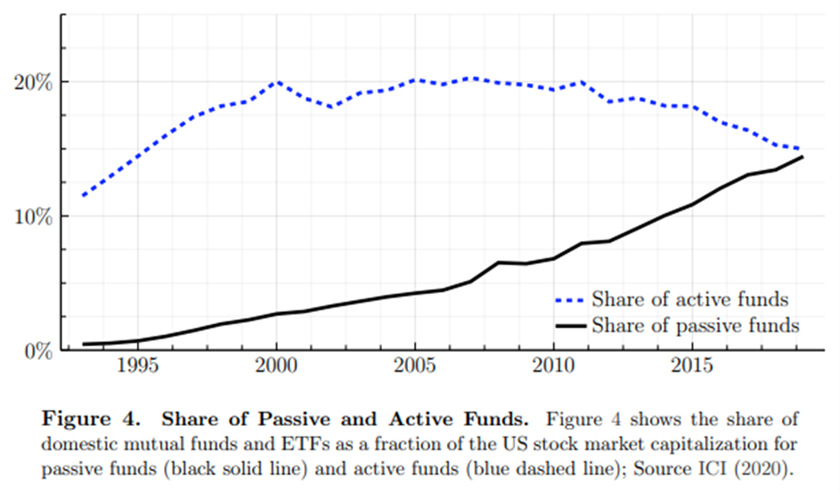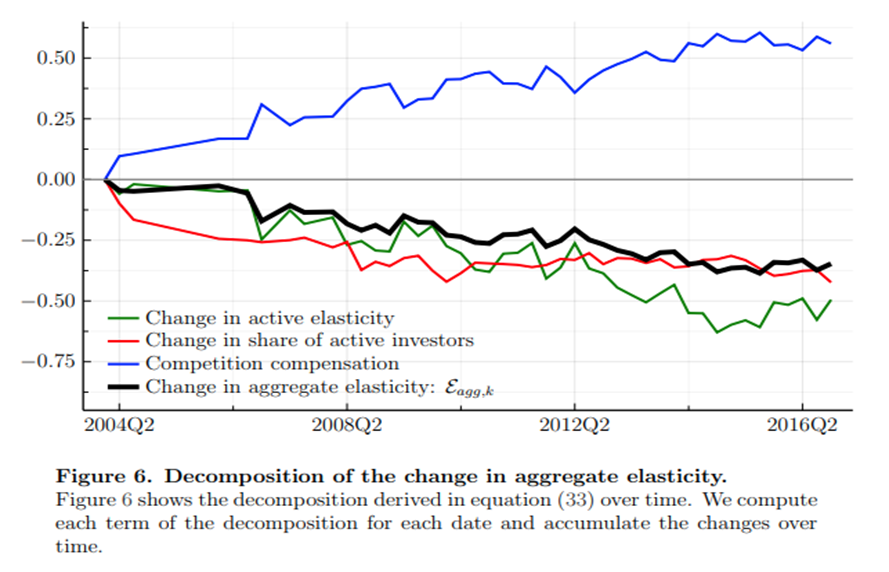The rise of passive investing over the past two decades has been a major influence on reducing stock market efficiency by over a third, academic research has claimed.
The paper, titled How Competitive is the Stock Market? Theory, Evidence from Portfolios and Implications for the Rise of Passive Investing, found the aggregate stock-level elasticity – how reactive share prices are to supply and demand – fell by -35% between 2004 and 2016.
Of that, the increase in passive investing over those 12 years accounted for a 15% decline alone, it said.
In the US, the share of passive funds has grown from 0% in 1990 to 15% in 2019, according to the research. Conversely, the share of active funds topped out at the end of the 1990s, falling from 20% in 2000 to 15% in 2019.

Source: How Competitive is the Stock Market? Theory, Evidence from Portfolios and Implications for the Rise of Passive Investing
The paper’s author and associate professor at the University of California Valentin Haddad wrote: “Over time we estimate that the aggregate stock-level elasticity has decreased by 35% on average. Consistent with the importance of the rise in passive investing, we find that the direct effect of the decrease in the fraction of active investors contributes to a drop of 49%.
“Interestingly, investors also decrease their own elasticities at the intensive margin. This second direct force further adds 42% to the drop.”
Haddad added the competitive response of the market mitigated some of the inelasticity, reversing more than half of the decline leading to a total change in aggregate elasticity of -35%.
However, the research found the composition of investors has been altered by the rise of passives, meaning investors' competitive response to one another is much weaker than first anticipated.
“In the US stock market, we find evidence that investors do react to each other but also that this response is much weaker than anticipated by classic views,” Haddad wrote. “The effects of changes in the composition of investors on the demand for a stock is reduced by 50%. This implies for example that the rise in passive investing leads to substantially more inelastic markets.”

Source: How Competitive is the Stock Market? Theory, Evidence from Portfolios and Implications for the Rise of Passive Investing
Joachim Klement, investment strategist at Liberum, said while fewer active managers are trading based on new information, keeping markets elastic, high-frequency trading (HFT) and other traders should lead to more efficient markets.
“A key component is the rise of HFT and other investors that systematically take advantage of market inefficiencies like post-earnings announcement drifts. The combined impact of these factors is an increase in share price elasticity of about 50%,” he continued.
“Besides, passive funds account for only about half the market so there are plenty of active managers around to keep markets efficient.”
Klement added market inefficiencies are much more prevalent at the small and mid-cap end of the market, with large-cap stocks benefitting from media attention and showing more efficient pricing as information is incorporated into the price almost immediately.
“The impact is much less for large-cap stocks since the study also shows that the largest stocks have share prices that are essentially perfectly elastic. It is once again in small and mid caps where markets are becoming less efficient,” he said.
The influence of passive investment vehicles has once again come to the fore in recent weeks as markets remain choppy.
Tesla founder and CEO Elon Musk took to Twitter recently to express his concerns about passive investment’s impact on shareholder engagement and went as far as to say this modern investing phenomenon has “gone too far”.
A separate post highlighted Modern Portfolio Theory and the rational approach to buying the market, however, it suggested the market reflects fundamentals only because active investors make it so.
Musk replied: “Exactly. Right before he died, Jack Bogle (of Vanguard fame) said index/passive funds were too great a percentage of the market and he really knew what he was talking about!”
BlackRock has already partially taken steps to democratise voting, offering voting rights on 40% of its equity index assets.
Related articles



